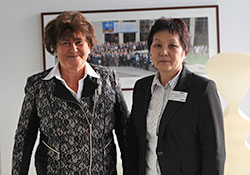Minister of Health of Kyrgyzstan signs agreement with WHO/Europe

WHO
Dr Dinara Sagynbaeva, Minister of Health of Kyrgyzstan, met Ms Zsuzsanna Jakab, WHO Regional Director for Europe, and other senior WHO staff on 31 October 2013. They discussed key health issues in Kyrgyzstan, including progress in mother and child health and the challenges of tuberculosis (including multidrug-resistant strains) and HIV/AIDS.
Kyrgyzstan’s health sector is being reformed through implementation of the new Den Sooluk Health Strategy (2012–2016), focusing on five health-system components (health care financing, reforms of public health services, improvement of individual health services, resource generation and stewardship) and four priority programmes (HIV/AIDS, mother and child health, tuberculosis and cardiovascular diseases).
The Regional Director explained the opportunity that national reform provides to adjust a country’s health focus, for example, to introduce universal health coverage, establish a stronger intersectoral approach and increase investment in health. She underlined the importance of including health financing in reform, and implementing the values of Health 2020, the European health policy framework, by strengthening the health system.
Biennial collaborative agreement signed
Dr Sagynbaeva and Ms Jakab signed the biennial collaborative agreement (BCA) between Kyrgyzstan and WHO/Europe for 2014–2015. Building on previous achievements, WHO/Europe provides support to the Government of Kyrgyzstan through the BCA, which includes the following priorities:
- increasing access to key interventions for people living with HIV, stronger surveillance, care and control for tuberculosis, and increased vaccination coverage for hard-to-reach populations;
- increasing access to interventions to prevent and manage noncommunicable diseases and their risk factors, and services for mental health, and focusing on road safety, child injuries and violence against children, women and young people;
- focusing on improving the health of women, newborn babies, children and adolescents through a life-course approach and reducing environmental threats to health;
- ensuring that the national health policy, Den Sooluk, is adapted to Health 2020, increasing access to people-centred integrated health services, improving access to and the rational use of safe high-quality medicines and health technologies, and strengthening the civil registration and vital statistics systems, including health monitoring and reporting; and
- developing capacity for implementation of the national plan for the International Health Regulations (IHR), development of a pandemic preparedness plan, and disaster risk management and training; and improving laboratory-based surveillance for poliomyelitis and influenza.



